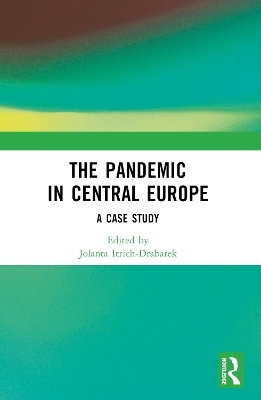
The Pandemic in Central Europe
A Case Study
Seiten
2024
Routledge India (Verlag)
978-1-032-40592-6 (ISBN)
Routledge India (Verlag)
978-1-032-40592-6 (ISBN)
This book studies the different models adopted by contemporary states in Central Europe in fighting SARS-CoV-2 virus. With thorough analysis of different results and impacts of governmental policies, the authors examine the direction of the global economy after the pandemic ends.
This book studies the different models adopted by contemporary states in Central Europe in fighting the SARS-CoV-2 virus. With thorough analysis of different results and impacts of governmental policies, the authors examine the direction of the global economy after the pandemic ends.
The volume:
Analyzes the risks and effectiveness of the policy strategies taken by political regimes within states of central Europe;
Probes into the changes in the functioning of post-pandemic society, especially the limitations of human rights due to state coercion and corruption risks;
Understands issues related to the law-making process, healthcare policy, digitisation of state institutions and key processes carried out by entities of the system of public authority, and the establishment of principles and mechanisms of cooperation between the state and the business environment;
Distinguishes the approaches of central and local administrations and of public authorities and citizens to the pandemic phenomenon;
Assesses the actions taken by NATO and the national armed forces in the fight against the COVID-19 pandemic, with particular emphasis on the situation in the Visegrad Group countries.
A timely study, this will be of great interest to scholars and researchers of political theory, sociology, public health and social care, governance, public policy, security studies and public administration.
This book studies the different models adopted by contemporary states in Central Europe in fighting the SARS-CoV-2 virus. With thorough analysis of different results and impacts of governmental policies, the authors examine the direction of the global economy after the pandemic ends.
The volume:
Analyzes the risks and effectiveness of the policy strategies taken by political regimes within states of central Europe;
Probes into the changes in the functioning of post-pandemic society, especially the limitations of human rights due to state coercion and corruption risks;
Understands issues related to the law-making process, healthcare policy, digitisation of state institutions and key processes carried out by entities of the system of public authority, and the establishment of principles and mechanisms of cooperation between the state and the business environment;
Distinguishes the approaches of central and local administrations and of public authorities and citizens to the pandemic phenomenon;
Assesses the actions taken by NATO and the national armed forces in the fight against the COVID-19 pandemic, with particular emphasis on the situation in the Visegrad Group countries.
A timely study, this will be of great interest to scholars and researchers of political theory, sociology, public health and social care, governance, public policy, security studies and public administration.
Jolanta Itrich-Drabarek is a Professor at the University of Warsaw. She is a political scientist and holds a PhD with "habilitation" in social science and is a Member of the Scientific Excellence Council of the 1st term.
Introduction. 1. Central European countries in times of plague: a historical perspective 2. Countries in Central Europe and the pandemic 3. Management of restrictions during the SARS-CoV-2 pandemic in Central European countries 4. Major challenges facing states in pandemic conditions 5. Solving social problems during a pandemic 6. State and society in times of a pandemic 7. The situation and role of the armed forces during the pandemic. Summary.
| Erscheinungsdatum | 04.10.2023 |
|---|---|
| Zusatzinfo | 3 Tables, black and white; 4 Line drawings, black and white; 4 Illustrations, black and white |
| Verlagsort | London |
| Sprache | englisch |
| Maße | 156 x 234 mm |
| Gewicht | 381 g |
| Themenwelt | Sachbuch/Ratgeber ► Gesundheit / Leben / Psychologie |
| Medizin / Pharmazie ► Gesundheitswesen | |
| Studium ► Querschnittsbereiche ► Prävention / Gesundheitsförderung | |
| Sozialwissenschaften ► Politik / Verwaltung | |
| Sozialwissenschaften ► Soziologie ► Spezielle Soziologien | |
| ISBN-10 | 1-032-40592-9 / 1032405929 |
| ISBN-13 | 978-1-032-40592-6 / 9781032405926 |
| Zustand | Neuware |
| Informationen gemäß Produktsicherheitsverordnung (GPSR) | |
| Haben Sie eine Frage zum Produkt? |
Mehr entdecken
aus dem Bereich
aus dem Bereich
das Manual zur psychologischen Gesundheitsförderung
Buch | Hardcover (2023)
Springer Berlin (Verlag)
39,99 €
Wissenschaftlich basierte Empfehlungen, Tipps und Ernährungspläne für …
Buch (2022)
Thieme (Verlag)
51,00 €


